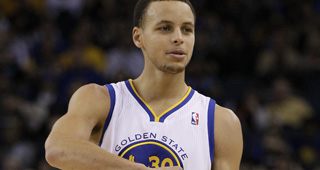At this point in the season with their playoff chances all but gone, it more productive to spend less time thinking about where the Warriors are in the narrow short term and more on looking to how the team 'will' and 'should' look in the future.
The fundamental challenge for Golden State moving forward is just how hard it will be for them to improve.
Sure, there can be some improvement by the players currently getting minutes (especially the guys on their rookie deals) and overall shifts by getting a greater emphasis on defense, but the fact of the matter is that the best reasonable form of this team puts them fighting for the bottom few seeds in the Western Conference over the next few seasons.
Now, some people may be happy with that as the endgame for this squad, and that is clearly within their rights considering the wilderness the organization has been in the last 15 years. What makes Golden State’s situation so difficult moving forward is how hard it will be for the team to improve the talent on the roster.
There are three different groups of assets in most situations: young/developing players, underpaid players, and picks/cap assets.
While the Warriors have a few good youngsters like Stephen Curry, those are exactly the guys that the team should hold onto if they are building for the future unless the perfect deal comes along. The first group flows nicely into the second since many young players are underpaid by virtue of being on the rookie salary scale, artificially weakening their wages for at least the first few years of their career.
Beyond them, the Warriors have an interesting asset in Dorell Wright, who has clearly outpaced his three-year contract signed last summer. Unfortunately, the same issue with Curry presents itself here as Wright is the type of player the team should be building around for the next two seasons instead of being an asset.
Beyond those guys, the pickings are slim. Andris Biedrins and David Lee are either overpaid or properly paid, making their value somewhat limited, especially in light of their performance this season.
Monta Ellis has shown some major potential this year coupled with a maturity in his game that has become a consistently pleasing surprise this early in his career. The challenge with selling Ellis to other teams is his combination of slight frame, lack of a clear defensive position (he should guard opposing PG’s, but should not handle the ball as a primary), and lack of production in ways other than scoring since steals are a terrible measure of defensive prowess. He clearly has value in the right situation, yet it seems hard to find both the right one and a team that would be willing to compensate the Warriors fairly and fully for it.
Incidentally, the Portland Trailblazers might make some sense as he could fit nicely next to Brandon Roy over time. The challenge there is getting the right assets back, as Portland stands in an interesting long-term salary position and adding in someone like Ellis would be a big roll of the dice.
While we do not know the nature and structure of the next collective bargaining agreement, it stands as unlikely that the Warriors would have cap space or flexibility to use to their advantage. Having $31 million committed to Lee, Biedrins, and Ellis coupled with another $15 or so million on other talent likely leaves the team with MLE or equivalent money/space. Add in a late lottery pick and you have a slightly but not markedly better squad for whenever the NBA starts playing real games again.
One thing to consider here is that deepening this team may have reduced effects compared to most teams because of how the starters are used. Now, some can argue that the starters would play less if they had better backups, and they could be right. However, I see Curry, Wright, Lee, and especially Ellis living on the court unless their backups were among the absolute best in the league. As such, improving the bench would help the margins for the team yet likely would not do much beyond that since those four and Udoh likely play around 70% of the minutes during the 2011-12 season.
The other factor here is the ownership. While the Warriors are unlikely to have meaningful assets if the NBA adopts a close variant to the current system, a hard cap system would give them space to spend. While Bob Fitzgerald espoused this possibility in the season ticketholders conference call (which Mr. Lacob could not discuss, for obvious reasons), I cannot shake the feeling that it would not matter. A defining experience for me with this group was when Matt Steinmetz asked Lacob in his first interview after winning the bidding process if he and the group would be willing to pay the luxury tax. Lacob’s first response was a 'no' which later got walked back a little. Unless we get a real commitment from the brass that they are willing to put their money where their mouth has not been yet (unless you count giving away Brandon Wright and losing a few hundred thousand dollars to get a middle 2nd round pick in 2012…), it seems fruitless to think that significant spending will come should the opportunity arise. Of course, it would be great to be proven wrong there, and I welcome an honest, open discourse if there is disagreement from management on this position.
Beyond those moves, I’m sure some will point to coaching as a possible upgrade. Beyond being impressed with how much more the players seem willing to talk about defense (a major change from most of last season), the overall problem that persists is that very few coaches actually make a dramatically positive impact on their team’s fortunes. Some are clear negatives (they will remain nameless), some like Gregg Popovich, Tom Thibideau appear to help their teams, and the vast majority live in the gray area between the two. Keith Smart does not fit in either of the first two groups but it would be awfully hard for the Warriors to snag one of those remarkably few guys. As one of the people hoping to woo Brian Shaw last summer, it should be imperative that the team be willing to identify and go after those guys, though the sheer odds of getting one are long at best.
As such, what seems like the course is to try to maximize the talent already in Oakland while keeping an ear to the ground and praying that some team makes a terribly unbalanced trade offer. Hey, maybe some more Western Conference teams will trade their stars to the East and have an extra year or two before their young cores come together…



